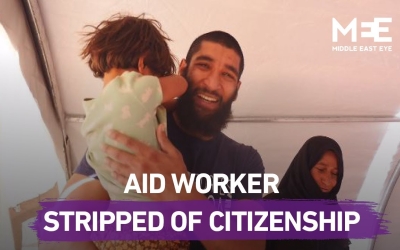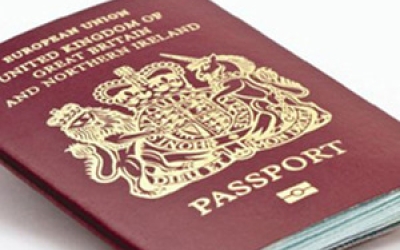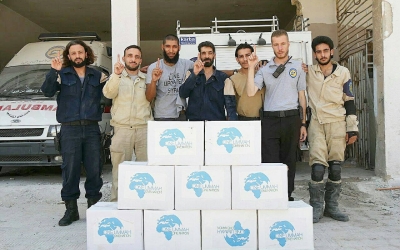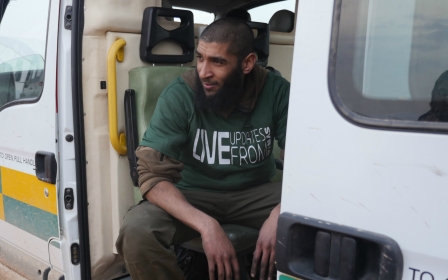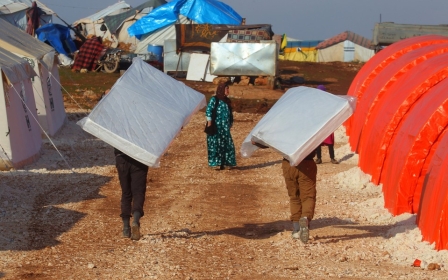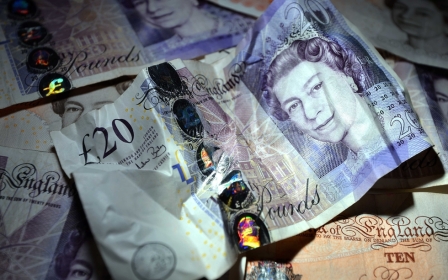EXCLUSIVE: British aid worker was blackmailed by Islamic State over gun photos
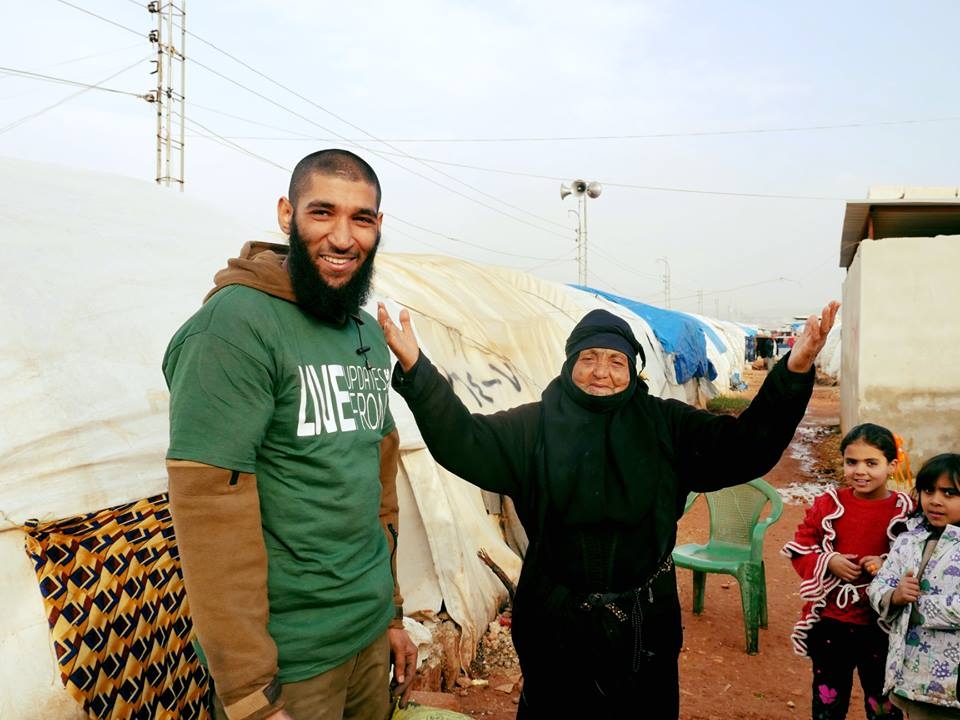
An aid worker in Syria who has been stripped of his citizenship by the British government has told Middle East Eye how the Islamic State (IS) group tried to blackmail him over photos it claimed to have showing him posing with weapons.
Tauqir Sharif said he was contacted by somebody who he understood to be a member of IS in 2015 who demanded that he pay $65,000 (£50,000) or risk the photos being passed onto the British, or their publication online.
He is now concerned that some of those photos, or similar ones, may form part of the government's secret evidence against him in his forthcoming appeal to have his citizenship restored.
Sharif, who has been based in the Atmeh camp in Idlib province since 2013, told MEE that he had posed for photos with weapons and with rebel fighters in the early days of the Syrian war when many other foreign visitors to opposition-held areas, often participants in aid convoys, were doing the same.
He says he now regrets having done so and dismisses the photos as “bravado”. He says he has also carried weapons during his time in Syria for protection, but now employs a security team.
New MEE newsletter: Jerusalem Dispatch
Sign up to get the latest insights and analysis on Israel-Palestine, alongside Turkey Unpacked and other MEE newsletters
Sharif said the threats started in late 2015 when he was first contacted via Viber, a voice messaging app, and continued every few weeks for about a year, with the demanded sum dropping over time to about $13,000.
'Money talks, and jihad needs money'
The voice on the other end of the line was always the same: a man speaking in non-native English with a European accent.
“He said 'we have pictures of you holding weapons'. He was mentioning people that I knew from a long time ago so they were definitely here. That was one of the things that was worrying to me.”
Sharif said he believed he had been targeted because of his high profile in the media, and because he had spoken out publicly against IS.
Since travelling to Syria in 2012, Sharif's work has been featured by many western media outlets, including the BBC, ITV News, Channel 4 News and CNN, and his Live Updates From Syria organisation has a large online following.
“This person was harassing me for months and months. I tried to plead with him. I said, 'Look, this is not Islamically allowed. What you are doing is blackmailing me. You are not going to harm me, you are going to harm the Syrian people who we are supporting',” he said.
But the man dismissed the importance of the humanitarian effort to support Syrians affected by the war. According to Sharif, the man replied: “Money talks, and jihad needs money.”
After about a year, the phone calls stopped. “I just tried to drag it on and on. I never had any intention of paying them,” Sharif said.
Sharif on Monday revealed that he was among a number of British nationals in Idlib whose citizenship has been revoked on national security grounds, as first reported by MEE in 2017.
Sharif said he had decided to waive his own right to anonymity in his appeal case in order to highlight how the government's use of citizenship-stripping powers against people deemed to be dual nationals had created a “racist” two-tier hierarchy.
But he is concerned that photos of him holding weapons, and his use of weapons in self-defence and for protection, could be misconstrued when his appeal is heard in the Special Immigration Appeals Commission (SIAC), the court that deals with citizenship revocation cases.
Secret evidence
In defending its decision to strip someone of citizenship, the government is permitted to use information obtained by the intelligence services in secret, meaning that even the appellant and their legal team are not allowed to see or challenge evidence being presented against them.
The UK and citizenship-stripping powers
+ Show - HideThe UK has been described by researchers as a “global leader in using citizenship deprivation as a counterterrorism measure”.
Historic citizenship-stripping powers targeted at naturalised citizens on disloyalty grounds had largely fallen into disuse prior to 2002, when the government introduced new measures in an attempt to revoke the citizenship of Abu Hamza, an Egyptian-born cleric subsequently convicted of terrorism in the US.
The 2002 legislation allowed for British-born nationals as well as naturalised citizens to lose their nationality rights. Successive governments gradually broadened the scope of the powers so that home secretaries can now deprive anyone of citizenship if they are satisfied that doing so is “conducive to the public good” and would not leave an individual stateless.
No criminal conviction is required. Letters often state that individuals have been assessed as presenting “a risk to the national security of the United Kingdom”.
The government’s use of the powers surged to unprecedented levels in response to the perceived threat posed by British nationals returning from Syria.
Between 2010 and 2015, 33 people were stripped of their citizenship, according to Home Office figures. In 2016, 14 people were deprived, and in 2017 the number jumped to 104.
In 2018, the figure was 21, and in in 2019 - when Shamima Begum was among those targeted - it was 27. It then dropped to ten in 2020 and eight in 2021.
Some subjects of citizenship-stripping orders argue that they have been left effectively stateless, because the government bases its assessment that they are dual nationals on a right of citizenship to a parent’s country of birth, even if they have never taken up that citizenship or even visited the country.
In some cases the Special Immigration Appeals Commission, which rules on citizenship cases, has agreed: it has ruled in favour of British nationals of Bangladeshi descent on the grounds that Bangladesh does not consider them citizens if they have not claimed Bangladeshi nationality before the age of 21.
Human rights organisations and lawyers have compared the powers to “medieval exile and banishment”. Critics also point out that the powers create a two-tier system in which only those deemed to be dual nationals are at risk of losing their British citizenship; a measure that discriminates against naturalised citizens, immigrants and their children.
Instead, government-vetted lawyers known as special advocates are appointed to represent the appellant, but they are not allowed to speak to each other once the special advocate has had sight of the "closed evidence".
Sharif said he had occasionally posed for photos with weapons or with rebel fighters in his first year in Syria at a time when there had been an influx of foreigners visiting the country to deliver aid and to show support for the rebels' fight against Syrian President Bashar al-Assad.
'Young guys like tanks and machine guns. It's bravado, nothing more'
- Tauqir Sharif
“It could be me just posing with an AK-47 or on a tank. It wouldn't have been any more than that,” he said.
“If I could go back I wouldn't have done any of that. But unfortunately it was normal. Young guys like tanks and machine guns. It's bravado, nothing more.”
During 2012 and 2013, several large aid convoys travelled across Europe from the UK to Syria, with many participants venturing into rebel-held territory and sometimes posing for photos with weapons and fighters before crossing back into Turkey and returning home.
Hundreds of people from the UK are also estimated to have travelled to Syria at the time to join fighting groups, prompting a government crackdown on the aid effort and Syria-focused charities which had largely halted the flow of convoys by 2014.
Since then, aid from the UK to opposition-held Syria has mostly been delivered in shipping containers to the Turkish port of Mersin and then taken by truck into Idlib.
Sharif said it was plausible that somebody within IS had obtained photos of him because several people who he had known in Syria in the early days of the war before the emergence of the group had subsequently joined its ranks. They may have passed on photos or had their phones seized, he speculates.
“You've got to understand that it was very open in 2o13. You would go on convoys and maybe certain Free Syrian Army groups would give us protection. You would stand and pose with them. It was very relaxed.”
'You have to protect yourself'
Sharif also defended arming himself with an AK-47 for protection while delivering aid to frontline areas earlier in the war at a time when he could not afford to employ security guards.
He said he had twice been the target of bombings. On the first occasion, a bomb was planted under his car, but exploded before he got into it, destroying the vehicle.
Later, a bomb exploded in a building where he had been due to be holding a karate class for children, but had been running late. Nobody had been killed in either attack, he said.
“Thankfully, now I have a security team. But in the early days we were very small and we were going to a lot more frontline areas.
“Sometimes the road would get cut and we would be trapped, or sometimes our convoys would be attacked. Not just by the Bashar regime. When you are carrying aid, criminals see that aid as money.
“You have to be able to protect yourself. We've always done the bare minimum to protect ourselves and the people around us.”
Carrying weapons had also been normalised by the conflict and the daily dangers that many people had grown used to, even in areas away from frontline fighting, with guns for sale in roadside markets.
“Any 12-year-old boy outside could tell you how to use an AK-47. It's not that difficult,” said Sharif.
Middle East Eye delivers independent and unrivalled coverage and analysis of the Middle East, North Africa and beyond. To learn more about republishing this content and the associated fees, please fill out this form. More about MEE can be found here.


